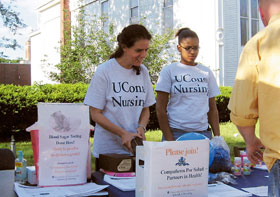  |
| HOME | THIS ISSUE | CALENDAR | GRANTS | BACK ISSUES | < BACK | NEXT > |
Nursing school creates outreach programs for local Latinosby Karen Singer - April 30, 2007 | ||||
| In Willimantic, where the Latino population struggles to meet basic health care needs, culturally appropriate mental health services are hard to find because local agencies lack sufficient resources and trained personnel.
Deborah Shelton, associate dean for research in the School of Nursing, is working with those agencies to set up a network of community-based providers and citizens to examine mental health issues for Latinos, who comprise nearly a third of the local population. Her work is funded by an $83,000 planning grant from the Federal Office of Rural Health. The grant is part of a larger project Shelton began three years ago to determine how the nursing school could partner with the Willimantic community to develop outreach programs for underserved health needs and provide a training ground for UConn students. Initial research showed that a top priority for the community was adding bilingual and culturally skilled health and mental health professionals, says Shelton, a psychiatric nurse. The project, “Compañeros Por Salud: Partners in Health,” has spawned a variety of collaborations with UConn nursing, social work, pharmacy, and medical students, who have taken part in student-run health clinics at a local soup kitchen and at local farms that employ migrant workers. During the spring semester, about 200 nursing students were placed in the community to offer health education and screenings. Last summer nursing graduate student Mary Grace Amendola taught mental health basics to a group of mostly Latino female community health workers, and created a mental health manual with bilingual resources. She says mental health concerns kept coming up in her interviews with 60 community members, “because of things like not having enough money to pay for their rent, and a lack of health care.” Michael Patota, division director of clinical services for United Services, says the mental health problems Latinos face are not very different from those of other ethnic groups. There are differences, however, in the way Latinos deal with such problems. “There’s a reluctance to seek out mental health treatment,” Patota says. “We’re frequently one of the last places they will come, after turning to a relative, friend, or minister for advice.” Puerto Ricans and Mexicans are the predominant Latino groups in Willimantic; other residents come from Central America, the Caribbean, and the Dominican Republic. Patota speaks of a constant struggle to find staff who not only can speak the language but also have an understanding of the culture and traditions. “In some cultures, there’s a belief in a kind of magical realism or spiritualism,” he says, and a mental health worker without that insight “might think a person is psychotic or delusional if they say, ‘Someone has put a curse on me; I’m seeing shadows and hearing voices’.” Such statements may not necessarily be signs of psychosis, he adds, for those who believe in spirits. Lack of fluency in English also can cause stress. “When the child speaks English and the adult can’t, that shifts the dynamic in the authority of the family,” Patota says. He is hoping UConn students who take part in internships at his agency will become employees. Amendola, the nursing graduate student, currently is an advisor on a community-inspired HIV intervention project targeting young adults. She’s also combining arts and crafts with health checks for Latino children. “We’re having more of a presence in the community,” Amendola says, “and it really, really has helped build trust.” With Shelton’s help, local agencies have come together to try to plan a formal network that can bolster health services and get students to augment those services. “We’re going to have a strategic plan that addresses the work force issue,” says Shelton. “Each of the partners will define how we’re going to get here. Then we’re going to lobby for dollars, get grants, and be creative, sharing people and helping people to recruit.” Shelton also has added a Spanish language proficiency requirement in a grant. |
| ADVANCE HOME UCONN HOME |

